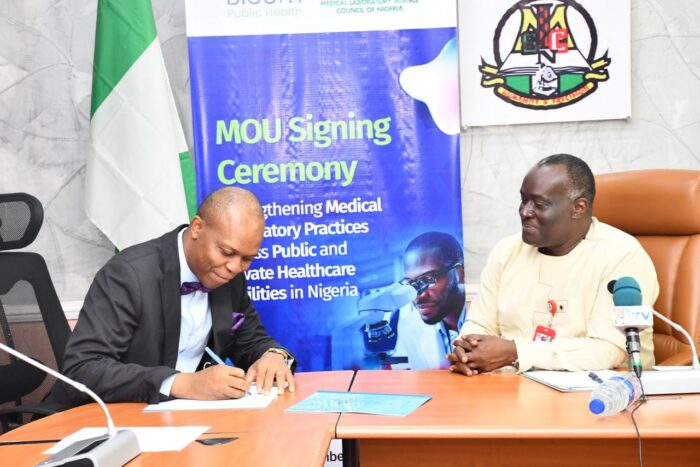The Medical Laboratory Science Council of Nigeria (MLSCN) says plans are in the pipeline to save two billion dollars for the country being money spent annually by Nigerians in search of qualitative diagnosis abroad.
The Registrar, MLSCN, Dr. Tosan Erhabor said this in Abuja on Friday at the signing of a Memorandum of Understanding (MoU) with the Bloom Public Health, an (NGO).
Erhabor said that the council would leverage on the partnership as it work towards transforming the sub-sector for the good of patients and to bequeath a culture of accurate and reliable test results.
“The coming together of the council and Bloom Public Health promises to change the narrative of poor health indices in the country.
“It will discourage health tourism to other climes and potentially save the country the sum of two billion dollars reportedly spend annually by the citizens in search of qualitative diagnosis,” he said.
According to him, the significance of the partnership lies in the determination to ensure that it enhances the quality of healthcare in the country in a significant and verifiable manner.
He said that the partnership would enable them embark on capacity building for medical laboratory professionals particularly at the primary healthcare.
Erhabor said that the partnership also intended to leverage Bloom’s continental reach, experience with donor funded project and technical expertise, with the council’s institutional base, network of scientists and proper context for the benefit of the public health.
He said that the immediate focus of the partnership would be the upscaling of capacity of laboratories at the primary healthcare level.
The Executive Officer of the NGO, Prof Chimezie Anyakaora, said the partnership was significant in order to enhance laboratory system in the country.
Anyakaora said the country would benefit from the partnership as the sector would witness lot of trainings from experts.
He said the NGO was the only African public health ready to support laboratory system in Nigeria.
“Our goal is to ensure that every Nigerian has access to proper heath care at the primary healthcare level,” he said.
Also, The Director and Deputy Registrar of the council, Dr. Donald Ofilisaid the country’s health system lack human resources and infrastructure.
Ofili said that capacity building was very important in addressing health care issues.
He expressed the hope that the partnership would change the current health indices in the country for the better.


